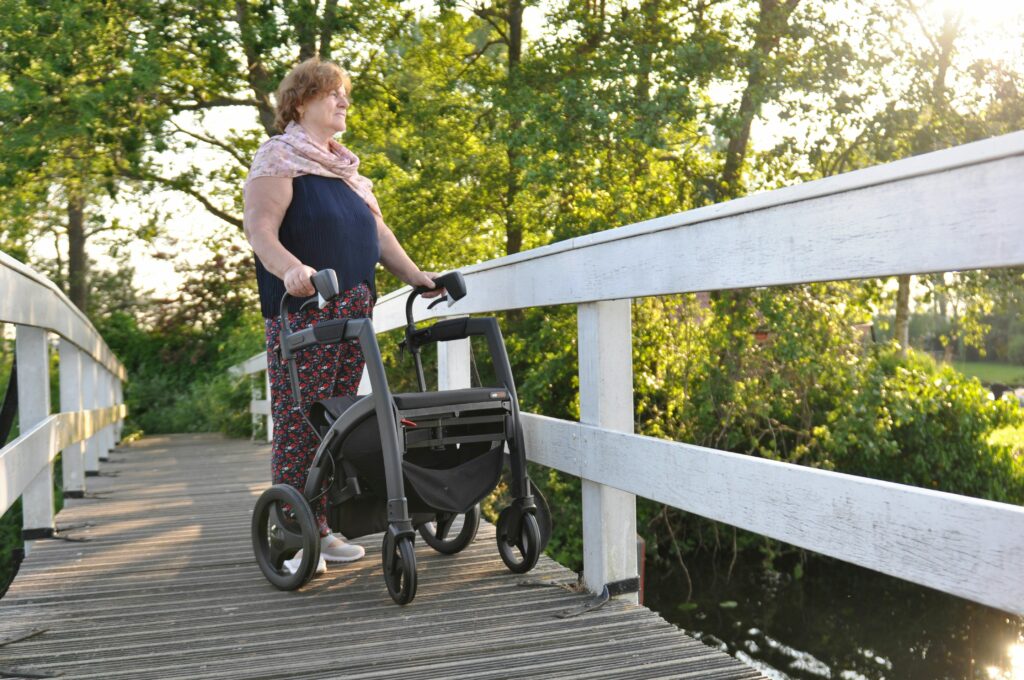
December 4th 2024
A recent collaboration between Hartland House care home and NHS Lancashire and South Cumbria Integrated Care Board (ICB) has shown remarkable success in reducing falls by 84%, supporting the NHS by alleviating unnecessary pressures and empowering care teams through cutting-edge AI technology. Through a six-month pilot project with Nobi’s Smart Lamps, this innovative approach is making strides in fall prevention, fall detection, and overall resident safety, enhancing the quality of life for both residents and care staff at Hartland House.
A New Approach to Care
Hartland House, a 31-bedroom residential care facility nestled in Milnthorpe, Cumbria, provides a welcoming, homelike setting where older adults, including those living with dementia, receive personalised care. The pilot project, managed by the team of Leanne Scrogham and Rebecca Etherington at Hartland House with support from NHS leaders Sue Capstick and Debb Gent, has transformed the care experience, particularly in preventing falls. The implementation of Nobi’s AI-powered smart lamps has, through the six-month pilot, proven to be an important turning point in resident safety.
Tackling Fall Prevention
Falls remain a leading cause of hospital admissions in the UK, placing strain on both the NHS and care facilities. Amid record-breaking ambulance wait times and overfilled hospitals, the NHS is under severe pressure, highlighting the urgency of preventive measures. By implementing a proactive approach to fall prevention at Hartland House, NHS Lancashire and South Cumbria ICB has found a scalable model that may significantly reduce fall-related hospitalisations and ambulance callouts which has the added benefit of helping to ease the burden on the healthcare system.
Technology in Action
The Nobi Smart Lamp combines optical sensors and AI to detect falls with remarkable accuracy, achieving a 100% detection rate and preventing 84% of falls. Positioned in residents’ rooms, these lamps use smart lighting to prevent disorientation at night, automatically alerting caregivers when residents get out of bed, thereby reducing the risk of falls. If a fall does occur, the lamp prompts the resident with a question to confirm their status and any response other than a clear “no” immediately notifies the care team. This has helped to reduce response times dramatically—from an average of 57 minutes down to just under 2 minutes.
“The lamps have significantly reduced response times, which means our residents get assistance promptly when they need it most,” says Rebecca Etherington, Health and Wellbeing Lead at Hartland House. “The peace of mind it brings to our team and residents’ families is invaluable.”
Results and Outcomes: Increased Safety and Operational Efficiency
After an initial implementation in eight high-risk bedrooms, the inspiring results prompted Hartland House to expand the technology throughout the entire home. By reducing falls by 84%, the AI lamps have empowered the care staff to make a pivotal shift from reactive to preventive care. As well as positively impacting residents, it has also allowed the team to save considerable time in administrative tasks. Each fall previously required up to six hours of administrative processing; with a significant decrease in falls, staff are better able to dedicate more time to meaningful, direct care.
In addition, the Nobi lamps have eliminated “long-lie” incidents, where residents may remain on the floor after a fall, which can result in severe health consequences and even fatality. By providing timely alerts, the technology has ensured a zero rate of long-lie falls, which improves health outcomes, reduces hospital stays, and further alleviates NHS costs.
A Potential Solution for the NHS
Scaling this kind of technology across the UK’s 600,000 care home beds could have a monumental impact. Currently, approximately 45% of falls in care homes result in ambulance callouts. Implementing Nobi’s technology nationwide has the potential to prevent up to 1,381 falls per day, potentially saving the NHS around £156,585 daily in ambulance costs alone.
Looking Forward
The team at Hartland House advocates for the broader use of AI-driven safety technologies in care homes across the UK. “If other care homes don’t get these lamps, I think it will be the biggest mistake they’ll ever make,” says Leanne Scrogham, Care Manager at Hartland House. “They should be in every care home in the country without a doubt.”
Nobi’s Smart Lamps have proven to be more than just a technological upgrade. They represent a meaningful advancement in resident care and staff support, offering peace of mind to families and reducing staff burnout. By creating a safer and more efficient care environment, AI technology like Nobi’s lamps shows us how considered innovation can improve the care we give.
Photo by Rollz International on Unsplash
View all case studies